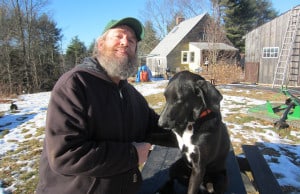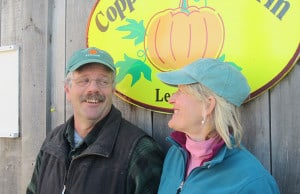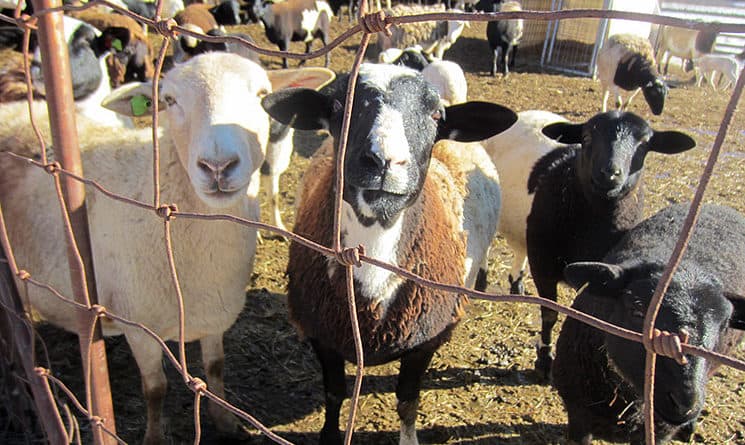Lee farmers share their stories at the Five Nights, 10 Farms event
Words and photos by Larry Clow
Lee is a farming town. Start at the Jeremiah Smith Grange Hall and drive the length of Lee Hook Road and you’ll pass a dozen or more farming operations, big and small — and that’s only a few of the farms located in the town. There are large operations like Coppal House Farm, where owners John and Carol Hutton raise sheep, pigs, and other animals; grow a variety of crops; and host a massive corn maze every fall. And there are smaller operations, like Misty Meadows Herbal Center, where herbs for tea blends, medicine, aromatherapy, and essential oils are grown.
Though each is different, the farms all share at least one thing in common — before any seeds were planted, each farming family had a dream. At “Five Nights, 10 Farms: Explore Your Farming Dreams,” a series of discussions with local farmers beginning on Monday, Jan. 26, local farmers will share their stories, talk about farming practices, and potentially inspire others to pursue their own passions for farming and gardening.
The Sound recently caught up with two of the farmers taking part in the program and asked them why they began farming and what advice they have for future farmers.
Steve Haendler, Mildred’s Drumlin Farm

Why did you become a farmer?
Farming is something I’d always wanted to do. I’ve lived on this land for 40 years, and I grew up across the street, so I guess it’s almost 60 years. I’ve always had huge gardens and kind of had dreams of expanding that. I also ran my own welding business for many years.
The economy in 2008 pretty much killed off my welding business. Not entirely, but mostly. We’d been a certified tree farm for a long time, and I had a small logging project I’d been trying to do for a while. … When the economy went bad, all of a sudden, people showed up to do it. All of these things converged: I engaged someone to do the logging project and we expanded it, cleared a little more land than we had already, got rid of some old Christmas trees, and we had enough money left over to invest in preparing the land and getting the equipment, so we didn’t have to lay anything out of pocket.
As my welding business started to peter out, we ramped up the vegetable business. … It was just sort of serendipity.
What’s inspired you to keep going?
I’ve always worked for myself, and I’ve always been kind of a naturalist and a hiker and an outdoors person. I like being outdoors and digging in the dirt. The change from being a gardener to being a farmer, even though I’ve been an organic gardener my entire life, I found that really engaging and interesting and a challenge in my way of thinking. It really inspired me.
What’s your advice for budding farmers or gardeners?
Don’t bite off more than you can chew. Be diverse, but not excessively so. Do the things you like to do. The hours and energy required (for farming) … the demand is so high for that, if you’re getting into a whole bunch of things you find aren’t interesting to you, there’ll be a lot of drudgery there. If you want to do vegetables, start with vegetables. … Find the thing that fits you and stay away from debt as much as you can. I inherited the land and built my own house … and did the infrastructure here … I’m not burdened by debt. Of course, if you’re 30 and buying your first place, you’re going to have debt. But being smaller and efficient and having less owed to someone else or the bank is a good way to begin.
John Hutton, Coppal House Farm

Why did you become a farmer?
I was one of those annoying kids in high school who always knew what he wanted to do. I was going to just milk cows, and then I figured out that was not going to be economically viable. … I’ve always been interested in (crop) diversity and what you could grow, and also incorporating the horses, the oxen, the mechanized equipment all together and getting the best out of both worlds.
How long have you been farming?
Since 1977. But we bought this farm in 2005. I grew up in Stratham, so I’m from away. … We were haying, raising heffers, raising a lot of sheep, working horses all the time, hauling cattle for most of the farmers in this area to the terminal market down in Littleton, Mass. We logged in the woods every winter and hayed all summer long and grew pumpkins.
What brought you to Coppal House?
We wanted to expand. We had a farm stand in Stratham, but we had limited acreage. And the handwriting was on the wall. We were getting run out of where we were — we were next to the Golf Club of New England. Everything gelled together for us. We started here in 2005 and had never had a corn maze in our lives. We moved in April 1st and had our first corn maze in September.
What keeps you farming?
I like working for myself. That’s the big thing — you control your own destiny. And we do enjoy dealing with the public.
What’s your advice for new farmers?
Don’t give up. I started with nothing, literally. I started with a half-ton pick-up truck, a pair of oxen, and a chainsaw. My parents lost the family farm the year before I was born and they started over again with nothing. Find out what you love to do and you’ll figure out a way to make it pay.
Five Nights, 10 Farms begins Monday, Jan. 26 at 7 p.m. at the Jeremiah Smith Grange Hall, Lee Hook Road, Lee. The series continues on Feb. 23, March 23, April 27, and May 18. For a complete schedule, visit seacoastlocal.org. For reservations, call the Lee Library at 603-659-2626.
A corn silo at the Coppal House Farm. At top of page, sheep at the Coppal House Farm.

